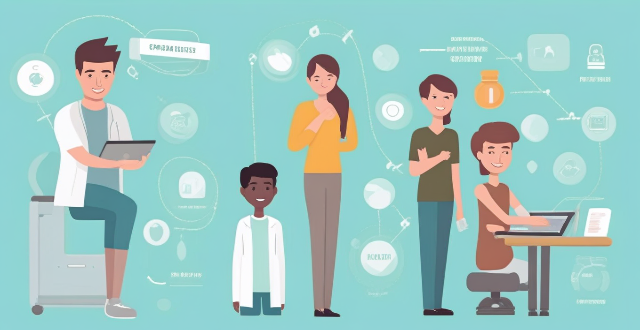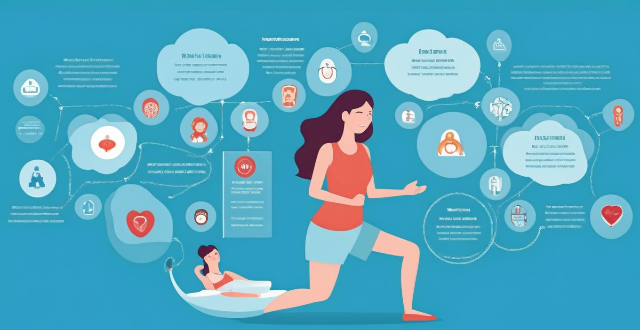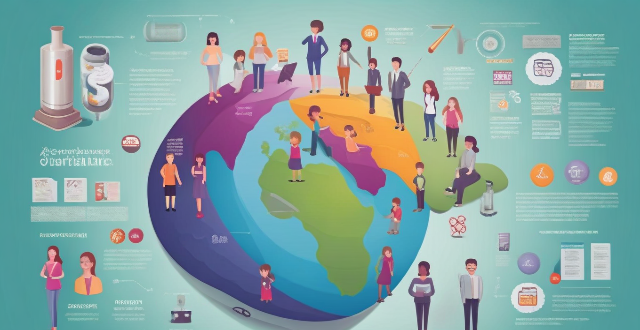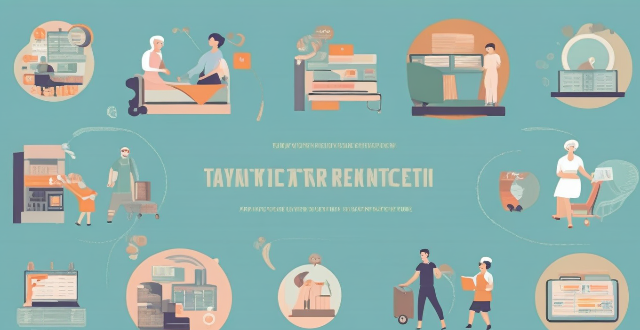Women Reproductive

What role does reproductive health play in overall women's wellness ?
Reproductive health is a crucial aspect of overall women's wellness. It encompasses the physical, emotional, and social well-being related to the reproductive system. Some key aspects of reproductive health include menstrual health, pregnancy and childbirth, contraception, screening and prevention, self-esteem, mental health, relationships, education and empowerment, access to care, and gender equality. By addressing these various aspects of reproductive health, we can ensure that women lead healthy, fulfilling lives both physically and emotionally.

How does climate change affect women's health and reproductive rights ?
Climate change has a significant impact on women's health and reproductive rights, including increased risk of displacement, violence, and sexual assault during extreme weather events; food insecurity and malnutrition affecting reproductive health; water scarcity leading to physical injuries and reproductive health problems; air pollution causing respiratory and heart diseases as well as complications during pregnancy; and mental health issues due to stress and fear of violence. It is crucial to take action to mitigate the effects of climate change and protect the health and well-being of all people, especially those who are most vulnerable.

How can women improve their fertility through nutrition ?
Women looking to improve their chances of conception can benefit from making dietary changes that support reproductive health. A balanced diet rich in essential nutrients, maintaining a healthy weight, focusing on specific fertility-boosting nutrients, limiting harmful substances, staying hydrated, managing stress levels, regular exercise, and consulting with healthcare professionals are key strategies. These nutritional approaches can create a supportive environment for reproductive health, potentially enhancing fertility.

How does climate change disproportionately affect women in developing countries ?
Climate change disproportionately affects women in developing countries due to socio-economic factors, cultural norms, and division of labor. Impacts include reproductive health issues, nutritional deficiencies, loss of traditional occupations, increased workload, water scarcity, and energy poverty. Adaptation and mitigation efforts should involve women in decision-making and build their capacities. Gender-sensitive policies and interventions are needed to address these challenges and promote a more equitable future.

What are the common fertility issues faced by women ?
Fertility issues can be a sensitive and complex topic for many women. There are several common fertility problems that women may face, which can impact their ability to conceive and carry a pregnancy to term. These include ovulation disorders, endometriosis, uterine fibroids, tubal blockage, and age-related infertility. It's important for women who are struggling with fertility to seek medical advice and explore treatment options that best suit their individual needs and circumstances.

What is the success rate of in vitro fertilization (IVF) for women ?
In vitro fertilization (IVF) success rate for women depends on age, cause of infertility, and quality of eggs and sperm. Younger women with healthy eggs and sperm have higher chances of success, while older women or those with certain causes of infertility may face lower success rates. Other factors such as the number of embryos transferred, clinic experience, and use of assisted reproductive technologies can also impact the outcome. It is important to consult with a qualified fertility specialist to determine the best course of action for achieving pregnancy through IVF.

How do women-specific NGOs measure their impact on reducing poverty and inequality ?
This article explores how women-specific NGOs measure their impact on reducing poverty and inequality by focusing on key metrics such as economic empowerment, education and skill development, health and well-being, and gender equality and empowerment. It also highlights successful NGOs like Women's World Banking, Room to Read, and International Planned Parenthood Federation (IPPF) that use data collection tools to track progress towards their goals.

How do cultural differences impact the experiences and opportunities for women around the world ?
Culture plays a significant role in shaping the experiences and opportunities for women around the world. It influences their roles, rights, and responsibilities, often leading to disparities in their access to education, healthcare, economic opportunities, and political representation. In this discussion, we will explore how cultural differences impact women's experiences and opportunities globally. Access to Education: Western cultures generally promote equal access to education for both genders, while traditional societies may prioritize male education over female, limiting women's opportunities. Developed nations offer quality education with diverse subjects including STEM fields, while developing nations often lack resources, resulting in fewer educational options for women. Reproductive Rights: Progressive cultures provide comprehensive reproductive health services, while conservative cultures may restrict access to contraception and safe abortion services. Industrialized countries have advanced medical facilities and prenatal care, while rural areas lack adequate healthcare infrastructure, increasing maternal mortality rates. Workforce Participation: Liberal societies encourage women's participation in various sectors, while patriarchal societies limit women to specific roles, reducing their economic potential. The Global North has legislation promoting wage equality, while the Global South often faces significant gender pay gaps due to cultural norms. Voting Rights: Democratic nations guarantee universal suffrage regardless of gender, while authoritarian regimes may restrict women's right to vote or run for office. Developed nations see an increase in female political leaders, while traditional societies rarely see women in high-level political positions due to cultural barriers. Marriage and Family Life: Western cultures promote marriage based on mutual consent and partnership, while arranged marriage cultures may limit women's choice in spousal selection. Dress Codes and Personal Freedom: Liberal societies allow individual expression through clothing choices, while restrictive cultures impose strict dress codes on women, limiting personal freedom. Addressing these disparities requires global efforts towards promoting gender equality and respecting human rights across all cultures.

How can a healthy diet improve women's reproductive health ?
A healthy diet is crucial for women's reproductive health, affecting fertility, pregnancy, and menstrual health. Essential nutrients like folic acid and iron support conception and hormone regulation. Calcium, vitamin D, and magnesium can reduce PMS symptoms, while iron-rich and antioxidant-rich foods improve period health. During pregnancy, nutrients like folic acid and iodine are crucial for fetal development, and fiber and hydration maintain maternal health. A balanced diet can also prevent gynecological issues like fibroids and ovarian cysts. Additionally, weight management and mental health through a healthy diet promote overall well-being. Consulting healthcare professionals for personalized dietary advice is recommended.

How do climate change impacts differ for men and women in urban vs. rural areas ?
Climate change impacts vary by gender and geography, with urban and rural areas presenting distinct challenges for men and women. Urban men benefit from more job opportunities and adaptation resources, while urban women face vulnerabilities during extreme events, health concerns, and economic disruption. Rural men are often dependent on natural resources for livelihoods and may migrate due to climate change, whereas rural women bear agricultural responsibilities, caregiving roles, and water collection tasks, all of which are affected by climate stressors. Key differences include resource access, infrastructure, livelihood dependencies, and gender roles, with women often bearing a disproportionate burden. Addressing climate change requires recognizing these differences and developing targeted strategies for the most vulnerable populations.

How can a balanced diet contribute to women's health ?
A balanced diet is crucial for women's health, providing essential nutrients, supporting reproductive health, managing weight, preventing chronic diseases, enhancing mental well-being, promoting bone and digestive health, and improving skin and hair health. By incorporating a variety of food groups, women can ensure optimal physical and mental well-being across their lifespan.

How have women's empowerment initiatives affected gender equality globally ?
The essay discusses the impact of women's empowerment initiatives on gender equality globally. The initiatives have increased access to education and training for women, leading to their active participation in public life. They have also provided economic empowerment through financial resources, microfinance loans, and entrepreneurship training programs, resulting in greater gender equality in the workplace. Health and reproductive rights have been improved through awareness campaigns and advocacy for policies supporting family planning and contraception. Finally, these initiatives have encouraged women's political participation, creating a more diverse and representative government. Overall, women's empowerment initiatives have played a crucial role in promoting gender equality worldwide.

What are the impacts of climate change on women's health and well-being ?
Climate change is a global issue that affects everyone, but its impacts are not distributed equally across all populations. Women are often disproportionately affected by climate change due to their roles in society and their biological differences from men. This essay discusses the various ways in which climate change can have negative impacts on women's health and well-being, including extreme weather events, food security and nutrition, water scarcity, reproductive health, and mental health. It is essential that we take action to mitigate the effects of climate change and ensure that all people, regardless of gender, can live healthy and fulfilling lives.

What are the benefits of having a higher level of scientific literacy among women ?
The article discusses the advantages of having a higher level of scientific literacy among women. It highlights how it leads to improved health outcomes, economic empowerment, environmental sustainability, social progress, and global impact. Women with strong scientific literacy are more likely to make informed healthcare decisions, pursue careers in STEM fields, engage in environmentally responsible behaviors, challenge traditional gender roles, and contribute to solving global issues. The benefits of enhancing women's scientific literacy are vast and far-reaching, making it a key component of our collective efforts towards creating a more equitable world where everyone has access to quality education and opportunities.

How often should a woman have a well-woman exam ?
A well-woman exam is crucial for maintaining good health and preventing diseases. Regular exams can detect abnormalities, early signs of cancer, and monitor reproductive health. The frequency of these exams depends on age, medical history, and risk factors. Women under 30 should have a Pap smear every three years, while those between 30 and 65 should have a combination of Pap smear and HPV test every five years. Women over 65 may consider stopping routine Pap smears after discussing with a healthcare provider. In addition to regular well-woman exams, women should also perform breast self-exams, get mammograms, and get tested for STIs regularly. By following these guidelines, women can ensure that they stay healthy and catch any potential issues early on.

How have historical events impacted the acceptance and participation of women in various sports throughout time ?
The text discusses how historical events and societal norms have influenced women's participation in sports throughout history. In ancient civilizations like Greece and Rome, women were generally excluded from athletic competitions due to cultural beliefs and expectations about their roles. During the Middle Ages, their involvement remained limited, with some exceptions for practical purposes. The Industrial Revolution brought slight progress as leisure time increased, but gender stereotypes still hindered women's participation. Pioneering figures in the late 19th and early 20th centuries began promoting women's sports, leading to the inclusion of women's events in the Olympics. After World War II, there was a push for gender equality, including in sports, resulting in increased opportunities for female athletes. Today, while women participate in a wider range of sports than ever before, challenges such as unequal treatment persist, requiring continued advocacy for gender equity in sports.

How does polycystic ovary syndrome (PCOS) affect fertility ?
Polycystic ovary syndrome (PCOS) is a common endocrine disorder that affects women of reproductive age, characterized by multiple small cysts on the ovaries, irregular menstrual cycles, and elevated levels of male hormones. PCOS can have a significant impact on a woman's ability to conceive naturally due to hormonal abnormalities that prevent regular ovulation. If a woman with PCOS wants to become pregnant, lifestyle changes such as losing weight through diet and exercise or quitting smoking and reducing alcohol consumption can improve fertility rates. Medications such as metformin and clomiphene citrate can help regulate hormone levels and promote ovulation in women with PCOS who want to conceive naturally. In vitro fertilization (IVF) may be recommended for women with PCOS who cannot conceive naturally or through other methods such as intrauterine insemination (IUI).

How does work-life balance impact women's physical health and well-being ?
The article discusses the impact of work-life balance on women's physical health and well-being, highlighting the following key points: 1. **Stress and Mental Health**: Work-life imbalance can lead to chronic stress, weakening the immune system and increasing the risk of mental health issues like anxiety and depression, which in turn can cause physical health problems. 2. **Physical Health**: An unbalanced lifestyle often results in a sedentary lifestyle and poor eating habits, leading to weight gain, obesity, and an increased risk of chronic diseases. 3. **Reproductive Health**: Excessive stress and unhealthy lifestyle habits can affect women's reproductive health, causing menstrual irregularities, infertility, and complications during pregnancy. 4. **Quality of Life**: Work-life imbalance can significantly impact a woman's quality of life, leading to feelings of dissatisfaction, reduced productivity, and strained relationships. Maintaining a work-life balance is crucial for ensuring that women's physical health and overall well-being are not compromised.

What is the role of a female therapist in treating women's psychological problems ?
The text discusses the role of a female therapist in treating women's psychological problems, emphasizing empathy, understanding, building trust, addressing gender-specific issues, and providing supportive interventions. The article suggests that women may feel more comfortable sharing their experiences with someone who can relate to their struggles and acknowledges the importance of validation for women who have been dismissed or minimized by others. Building trust is essential, especially for women who have experienced trauma or abuse, and creating a safe space involves establishing clear boundaries and maintaining confidentiality. Cultural sensitivity is also crucial when working with women from different backgrounds. Addressing gender-specific issues such as reproductive health concerns, body image, and trauma requires specialized treatment approaches. Providing supportive interventions like mindfulness practices and group therapy can help women connect with others and receive support from peers. Overall, the role of a female therapist is multifaceted and involves creating a safe and non-judgmental space to help women navigate their unique challenges and work towards improved mental health outcomes.

How effective have feminist movements been in improving women's lives ?
Feminist movements have been transformative for women's lives by advancing their rights and opportunities. They have challenged societal norms, dismantled barriers, and fostered legal and cultural changes. Key areas of impact include legal changes such as suffrage, equal pay, reproductive rights, domestic violence, and sexual harassment laws. Cultural shifts have been made towards challenging gender stereotyping, improving media representation, and promoting education and empowerment. Economic participation has seen more inclusive workplaces, support for female entrepreneurs, and advocacy for fair labor practices. Health and well-being improvements include better maternal health care, increased access to health services, and de-stigmatization of mental health issues. Political representation has seen more women in leadership roles and the implementation of quota systems. Educational advancements include initiatives to keep girls in school longer and increase access to higher education. Social security and safety measures have been put in place to protect women from violence and trafficking. Overall, feminist movements have been instrumental in shaping a more equitable world for all genders.

What are the benefits of a plant-based diet for women ?
A plant-based diet offers numerous health benefits for women, including improved cardiovascular health, weight management, cancer prevention, bone health, reproductive health, digestive health, skin health, and mental wellbeing. It is important to consult with a healthcare professional or registered dietitian when making significant dietary changes.

How can women effectively manage their wealth ?
Managing wealth is crucial for women to achieve financial security. Tips include setting SMART financial goals, creating a budget, building an emergency fund, investing wisely, prioritizing retirement savings, and seeking professional advice. By following these steps, women can effectively manage their wealth and achieve their financial goals.

What are the current trends in fundraising for women's rights and empowerment initiatives ?
Fundraising for women's rights and empowerment initiatives is gaining momentum, driven by various stakeholders. Corporate social responsibility programs focus on education, microfinance, and mentorship for women. Philanthropic foundations like the Gates and Ford Foundations invest in health, economic empowerment, and leadership projects. Crowdfunding platforms such as Kickstarter and GoFundMe enable individuals to support causes like legal fees for victims of harassment. Government grants from the US and EU fund reproductive health and gender equality projects. These efforts are crucial for promoting gender equality and ensuring equal opportunities for all.

What are the best practices for women's health maintenance ?
The text outlines best practices for women's health maintenance, emphasizing regular check-ups and screenings, healthy eating habits, physical activity, mental health care, reproductive health, preventive measures, and lifestyle choices. The article suggests annual wellness visits, pap smears and HPV tests, mammograms, breast self-exams, a balanced diet with plenty of water and limited processed foods, regular exercise including strength training and flexibility exercises, stress management, adequate sleep, social support, professional help for mental health concerns, discussion of birth control options, menstrual hygiene, pregnancy care, staying up to date on immunizations, sun protection, safe sex practices, limiting alcohol, avoiding smoking, and steering clear of illicit drugs. These recommendations are intended to help women maintain their health and wellbeing throughout their lives, with the caveat that individual circumstances and needs should guide healthcare decisions in conjunction with professional advice.

In what ways does education empower women socially and politically ?
Education is crucial for women's empowerment, enabling them to challenge societal norms and contribute more fully to society. It fosters increased awareness, improved socioeconomic status, and enhanced social relationships. Education also leads to greater political participation, policy influence, and promotion of gender equality. Overall, education enriches society by improving the lives of women and contributing to a more equitable world.

How can women build a diversified portfolio to minimize risks and maximize returns ?
The article provides a comprehensive guide on how women can build a diversified portfolio to minimize risks and maximize returns in the stock market. It emphasizes the importance of education, starting early, setting clear goals, diversifying investments across different asset classes, industries, and geographic regions, rebalancing regularly, and considering professional advice when needed. By following these tips, women can create a strong foundation for long-term financial success.

How can I get involved with women-focused charity work locally or internationally ?
Involving in women-focused charity work is a meaningful way to promote gender equality and empower women. This guide provides tips on how to get involved locally and internationally, including researching organizations, volunteering time, donating money or resources, attending events and fundraisers, fundraising for international organizations, participating in online campaigns, and traveling abroad to support women's issues. Additionally, it emphasizes the importance of being open-minded, building relationships, staying informed, and evaluating your impact to make the most of your participation.

What is the impact of social media on women's mental well-being ?
Social media has become an integral part of our daily lives, and it has both positive and negative impacts on women's mental well-being. In this article, we will discuss the various ways in which social media affects women's mental health. ### Negative Impacts: #### 1. **Comparison and Jealousy** One of the most significant negative impacts of social media on women's mental well-being is the constant comparison and jealousy that arises from seeing other people's highlight reels. Women often compare themselves to others on social media, leading to feelings of inadequacy and low self-esteem. This can result in anxiety, depression, and even eating disorders. #### 2. **Cyberbullying and Harassment** Social media platforms are also notorious for cyberbullying and harassment, particularly towards women. Online harassment can take many forms, including trolling, stalking, sexual harassment, and doxxing. These actions can have severe consequences on a woman's mental health, leading to trauma, anxiety, and depression. #### 3. **Addiction and Time Management** Social media addiction is another issue that affects women's mental well-being. Spending excessive time on social media can lead to procrastination, reduced productivity, and poor time management skills. This can cause stress, anxiety, and feelings of guilt, ultimately affecting a woman's overall mental health. #### 4. **Body Image Issues** Social media is flooded with images of perfect bodies and beauty standards, which can negatively impact a woman's body image. Constant exposure to these unrealistic beauty standards can lead to body dysmorphia, eating disorders, and low self-esteem. ### Positive Impacts: Despite the negative impacts, social media also has some positive effects on women's mental well-being. #### 1. **Support and Community** Social media provides a platform for women to connect with like-minded individuals and form supportive communities. These online communities can offer emotional support, advice, and encouragement, helping women cope with various issues they face in their personal and professional lives. #### 2. **Education and Awareness** Social media is an excellent source of information and education on various topics related to women's health, such as menstrual hygiene, reproductive rights, and breast cancer awareness. This increased awareness can empower women to make informed decisions about their health and well-being. #### 3. **Self-expression and Creativity** Social media platforms provide women with an opportunity to express themselves creatively through writing, photography, art, or other forms of content creation. This creative outlet can serve as a therapeutic tool for women to cope with stress, anxiety, or depression. #### 4. **Career Opportunities** Social media has opened up numerous career opportunities for women in fields such as digital marketing, content creation, and influencer marketing. These opportunities allow women to pursue their passions while maintaining flexible work schedules that accommodate their personal lives. In conclusion, social media has both positive and negative impacts on women's mental well-being. While it can lead to comparison, jealousy, cyberbullying, addiction, and body image issues, it also provides support, education, self-expression, and career opportunities. It is essential for women to be aware of these impacts and use social media mindfully to maintain their mental health and well-being.